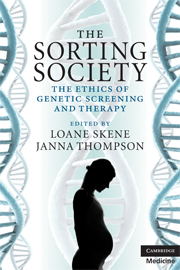Book contents
- Frontmatter
- Contents
- List of contributors
- Preface
- 1 Introduction
- 2 Genetic testing, an informed choice
- 3 Sex selection: sorting sperm as a gateway to the sorting society?
- 4 Cloning to avoid genetic disease
- 5 Procreative Beneficence: reasons to not have disabled children
- 6 Reprogenetic technologies: balancing parental procreative autonomy and social equity and justice
- 7 Genetic technology and intergenerational justice
- 8 Genetic preselection and the moral equality of individuals
- 9 Genes, identity and the ‘expressivist critique’
- 10 Overstating the biological: geneticism and essentialism in social cloning and social sex selection
- 11 The sorting society: a legal perspective
- Index
- References
8 - Genetic preselection and the moral equality of individuals
Published online by Cambridge University Press: 16 September 2009
- Frontmatter
- Contents
- List of contributors
- Preface
- 1 Introduction
- 2 Genetic testing, an informed choice
- 3 Sex selection: sorting sperm as a gateway to the sorting society?
- 4 Cloning to avoid genetic disease
- 5 Procreative Beneficence: reasons to not have disabled children
- 6 Reprogenetic technologies: balancing parental procreative autonomy and social equity and justice
- 7 Genetic technology and intergenerational justice
- 8 Genetic preselection and the moral equality of individuals
- 9 Genes, identity and the ‘expressivist critique’
- 10 Overstating the biological: geneticism and essentialism in social cloning and social sex selection
- 11 The sorting society: a legal perspective
- Index
- References
Summary
Suppose that it becomes possible to control the genetic traits of our descendants, and thus treat them as a product which can be engineered to our liking. Employing a Kantian vocabulary, Habermas says that this is a kind of intervention which should only be exercised over things, never over persons. In The Future of Human Nature, Habermas develops a version of a common objection to genetic engineering – that it would involve treating humans as means rather than as ends. His formulation of this argument is important because he makes the novel claim that there is a somatic basis to our ethical freedom. We are embodied individuals and in order to regard ourselves as free and equal members of a community of similarly embodied individuals, we need to stand in a certain relationship to our own unchosen physical characteristics. The prospect of choosing the positive genetic characteristics of another person threatens to change the nature of that person's relation-to-self in a way that undermines his or her potential to become fully autonomous.
A number of philosophers working within the liberal tradition have argued that, for certain purposes, genetic selection and enhancement of embryos may be consistent with liberal principles. Liberal eugenics distances itself from the dark history of authoritarian, state-directed eugenics programmes, but asserts that parents' rightful freedoms entitle them to pursue some eugenic goals with respect to their children.
- Type
- Chapter
- Information
- The Sorting SocietyThe Ethics of Genetic Screening and Therapy, pp. 99 - 110Publisher: Cambridge University PressPrint publication year: 2008
References
- 1
- Cited by

